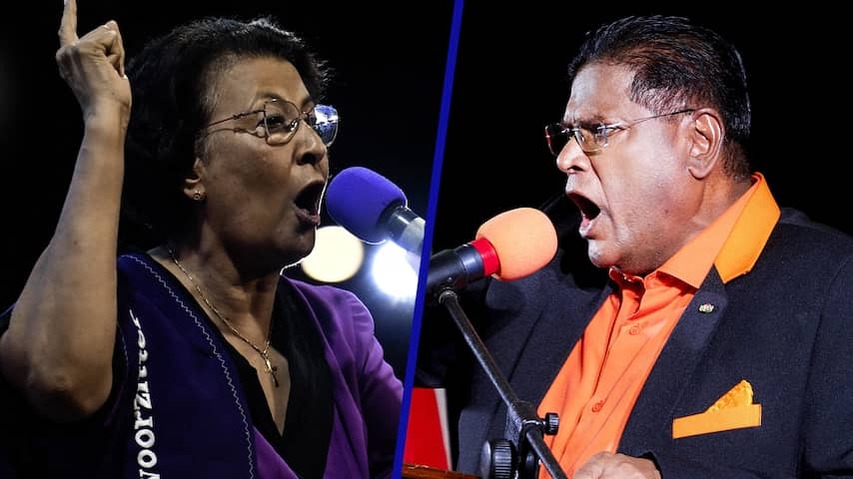
Suriname goes to the polls for parliamentary elections on the night of Sunday to Monday (Dutch time). The elections are organized differently this time, which will make it more difficult, especially for smaller parties. In addition, these are the first elections without Desi Bouterse.
The electoral system in Suriname has been thoroughly overhauled. Since 1987, the parliamentary elections have revolved around ten districts. The party with the most votes in a district received all the seats associated with it. Small parties in sparsely populated districts were therefore overrepresented in The National Assembly, the Surinamese parliament. They needed far fewer votes to win a national seat and did not have to be eligible everywhere in the country.
In the 2020 elections, Ronnie Brunswijk’s General Liberation and Development Party won eight seats with barely 25,000 votes. The National Party Suriname of Gregory Rusland received more than 32,000 votes, but won only three seats with that.
The Surinamese Constitutional Court ruled in August 2022 that parts of the electoral system are in violation of the Surinamese constitution and international treaties. For example, the distribution of seats across the ten districts was no longer correct, because the number of inhabitants had changed significantly. According to the court, there also had to be an end to the positive discrimination of remote and underdeveloped districts.
The structure of the elections was then adjusted. In the new electoral system, the national votes are distributed proportionally. A party that gets a quarter of all the votes also gets a quarter of the seats. Members of parliament spoke of a “historic moment”, because the parties reached agreement on the new electoral system remarkably quickly. That was partly due to time pressure, because the elections had already been planned for May 25, 2025.
New Rules Difficult for Small Parties
Due to the new rules, the upcoming elections will in any case cause a considerable shift. There are fourteen parties on the ballot on Sunday. They all had to have 51 candidates on their list. This means there are 714 candidates for the 51 seats to be distributed.
For new and small parties, a 51-member candidate list was quite a challenge. They called on enthusiastic compatriots via social media to join.
It was also more difficult for small parties to pay the deposit of around 518,000 Surinamese dollars (approximately 13,000 euros). If a party wins a seat, the amount will be refunded.
Struggling with Bouterse’s ‘Legacy’
The current president Chan Santokhi (VHP) and vice president Brunswijk are again the leaders of their parties. The National Democratic Party (NDP) is participating for the first time without Bouterse. The ex-president died last year as a fugitive. The party is now led by Jennifer Simons, who mainly does not want to talk too much about her predecessor.
“We have made many mistakes, all sorts of things have happened. And we have seen what can happen when there are people in power who do not know charity,” Simons said on Friday at the closing meeting of her party. Nevertheless, it is still possible to vote for a Bouterse. Ingrid Bouterse, the widow of the ex-president, is the party’s list pusher in 51st place.
The battle is mainly between VHP and NDP, currently the two largest parties in parliament. VHP of incumbent president Santokhi is currently the largest party in parliament with twenty seats. But the party seems to be less popular due to the major austerity measures that Santokhi has implemented in recent years.
NDP of the deceased Bouterse wants to profit from this and regain its status as the largest party. That is striking, because the austerity measures were precisely necessary after Bouterse left the country bankrupt.
Billions in Oil Revenues at Stake
In the run-up to the elections, opposition parties expressed their fears of fraud. A few weeks before the elections, hundreds of polling station employees in Paramaribo resigned. The Ministry of the Interior found replacements, but the opposition is calling for vigilance because of “these and other abuses.”
Surinamese elections are usually difficult to predict, and that seems even more difficult now due to the new structure. In addition, fake news is lurking. A poll from the medium claimed that the NDP has a huge lead over the VHP in the polls. But the message received a lot of criticism because the poll was allegedly misleading, intended to help the NDP get extra votes.
NDP leader Simons, in turn, already accused the government of “massive fraud”, without providing evidence for this. It is clear that Suriname is still dealing with corruption and cronyism.
The outcome of the elections is more important than ever for the future of Suriname. The country expects to raise billions from the sale of oil from 2028. A gigantic amount of money, especially for a country that currently has a GDP of around 4 billion euros. Monday morning (Dutch time) it will become clear which party(ies) will be allowed to spend that money.